
What is Schola Cantorum? It's a term that means "School of Singing" in Latin. This name has been linked to various groups and institutions dedicated to choral music for centuries. From its ancient roots in the early Christian Church to its modern-day revival, Schola Cantorum has played a vital role in preserving and performing sacred and secular music. These choirs have influenced famous composers, maintained high standards of choral singing, and engaged communities through their performances. Today, Schola Cantorum continues to inspire with its rich history and ongoing contributions to the world of music.
What is Schola Cantorum?
Schola Cantorum, meaning "School of Singing" in Latin, has a rich history in choral music. This term has been used to describe various groups and institutions dedicated to singing, both sacred and secular.
- Definition and Meaning: Schola Cantorum refers to a choir or group of singers focused on performing and preserving music. This term has historical and modern applications.
Historical Origins of Schola Cantorum
The roots of Schola Cantorum stretch back to ancient times, particularly within the early Christian Church.
-
Early Christian Church: In ancient Christianity, a schola cantorum was a group of trained singers performing liturgical music. They played a key role in developing Gregorian chant.
-
Medieval Period: During the Middle Ages, Scholae Cantorum were established in monasteries and cathedrals across Europe. They were crucial in composing, performing, and preserving liturgical music.
Schola Cantorum in the Renaissance and Baroque Periods
The Renaissance and Baroque periods saw a resurgence in the importance of Scholae Cantorum.
-
Renaissance Influence: These groups began incorporating secular music into their repertoire. The development of polyphony, characterized by multiple interweaving melodies, was driven by Scholae Cantorum.
-
Baroque Contributions: The Baroque period continued this trend, with Scholae Cantorum playing a significant role in the evolution of complex choral compositions.
The Modern Revival of Schola Cantorum
Interest in Schola Cantorum was revived in the 19th and 20th centuries, thanks to musicologists and composers.
-
19th Century Revival: French composer Charles Gounod revived the term in the late 19th century, founding the Schola Cantorum de Paris in 1894.
-
Schola Cantorum de Paris: This institution became a hub for studying and performing early music, offering courses in music theory, composition, and performance.
Impact on Choral Music
Schola Cantorum has had a lasting impact on the development and preservation of choral music.
-
High Standards: Emphasizing trained singers and traditional repertoire, Scholae Cantorum have maintained high standards of choral singing.
-
Influence on Composers: Many famous composers, like Palestrina, were influenced by the traditions of Schola Cantorum. Modern composers like Igor Stravinsky and Benjamin Britten also drew inspiration from these traditions.
Performance Practices and Educational Role
Scholae Cantorum are known for their precise performance practices and educational contributions.
-
Performance Practices: Historically, these groups used chant notation and emphasized correct pitch and rhythm. Modern performances often recreate these historical practices.
-
Educational Role: Scholae Cantorum have provided training for singers and musicians, ensuring the continuation of choral traditions.
Community Engagement and Contemporary Scene
Scholae Cantorum have played a significant role in community engagement and continue to thrive in the contemporary scene.
-
Community Engagement: By performing in public spaces, these ensembles have brought music to a wide audience, fostering a sense of shared cultural heritage.
-
Contemporary Scene: Today, various ensembles around the world use the term "Schola Cantorum," ranging from amateur choirs to professional organizations.
Notable Ensembles and Recording Industry
Several notable ensembles have adopted the name "Schola Cantorum," and the recording industry has helped them reach a wider audience.
-
Notable Ensembles: The Schola Cantorum of Oxford University and the Schola Cantorum of the University of California, Berkeley, are renowned for their performances of early music.
-
Recording Industry: Recording technology has allowed Scholae Cantorum to reach a broader audience, making historical and contemporary choral music accessible to many.
Challenges and Opportunities in the Digital Age
The digital age presents both challenges and opportunities for Scholae Cantorum.
-
Digital Platforms: Online platforms and digital media have expanded the reach of Scholae Cantorum, allowing enthusiasts to engage with their work globally.
-
Challenges: Maintaining high performance standards and engaging new audiences in a rapidly changing musical landscape are ongoing challenges.
Preservation of Tradition and Innovative Approaches
Preserving traditional performance practices while embracing innovation is crucial for the future of Scholae Cantorum.
-
Preservation of Tradition: Documenting and teaching historical techniques and notations are essential for ensuring the continued vitality of choral music.
-
Innovative Approaches: Modern Scholae Cantorum are blending traditional styles with contemporary influences, keeping choral music vibrant and relevant.
Cultural Significance of Schola Cantorum
Scholae Cantorum hold significant cultural importance, connecting the past with the present.
- Cultural Significance: These ensembles preserve musical heritage while enriching our cultural landscape with their performances. They represent a vital link between historical traditions and contemporary music.
The Enduring Legacy of Schola Cantorum
Schola Cantorum has left an indelible mark on choral music. From its ancient roots in early Christian liturgy to its modern-day revivals, this "School of Singing" has shaped the way we experience and appreciate choral works. It’s not just about preserving old traditions; it's also about inspiring new generations of musicians and composers. Institutions like the Schola Cantorum de Paris have played pivotal roles in this journey, blending education with performance. Today, various ensembles around the world carry the torch, ensuring that both sacred and secular choral music continue to thrive. The digital age has expanded their reach, bringing these timeless melodies to a global audience. Despite challenges, the commitment to high standards and historical accuracy remains strong. Schola Cantorum stands as a testament to the enduring power of choral music, bridging the past and present in harmonious unity.
Was this page helpful?
Our commitment to delivering trustworthy and engaging content is at the heart of what we do. Each fact on our site is contributed by real users like you, bringing a wealth of diverse insights and information. To ensure the highest standards of accuracy and reliability, our dedicated editors meticulously review each submission. This process guarantees that the facts we share are not only fascinating but also credible. Trust in our commitment to quality and authenticity as you explore and learn with us.


